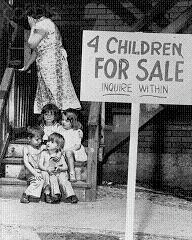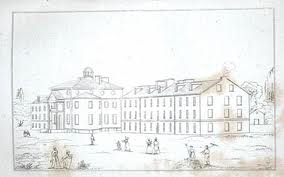Social Reforms of America: Early to Mid 19th Century
Poor Relief
When America was still rural, little effort was put into helping the poor. It was accepted throughout all the colonies that orphans and the children of parents who could not support them were bound out. Each locality would take only the responsibility of supporting poor families that reside there. And such provisions were often at the abode of others or their own homes. Even though larger towns have almshouses for the unfortunate aged, orphans, the maimed, or poor, these people could not receive proper care for there are no separation between different classes of inmates. Moreover, the imbecile and insane were often housed with them because there were no other place for these irrationals to be confined in. For example, the Boston House of Industry, built in 1821, was overcrowded with sixty insane or idiotic persons, one hundred and thirty ill and infirm, more than a hundred children and infants, and two hundred more listed as "unclassified."
To fulfill the duties at the lowest cost, each locality would bid children off at auctions for the labor they might perform. A town paid the lowest amount of bid for a child to be "sold." Whenever burden of caring for the ones unable to perform labor lay ahead, crafty selectmen would push the responsibility upon their neighbors. Since all the towns refused to provide for people without legal residence, the states had to pay for these expenses. The burden became heavier as immigration thrive along with the improvement of industry. Vagrants would wander from state to state, taking advantage of the aids offered by different administrations.
Humanitarians in the pre-Civil War period attempted to resolve these problems. They drew more attention into orphanages, house of correction, and insane asylums. People aroused awareness and sentiment against the "sale" of poor and practices of binding out orphans and unfortunates. Increasing almshouses were built through town and state funds. However, poverty could not be annihilated by human hands.
To fulfill the duties at the lowest cost, each locality would bid children off at auctions for the labor they might perform. A town paid the lowest amount of bid for a child to be "sold." Whenever burden of caring for the ones unable to perform labor lay ahead, crafty selectmen would push the responsibility upon their neighbors. Since all the towns refused to provide for people without legal residence, the states had to pay for these expenses. The burden became heavier as immigration thrive along with the improvement of industry. Vagrants would wander from state to state, taking advantage of the aids offered by different administrations.
Humanitarians in the pre-Civil War period attempted to resolve these problems. They drew more attention into orphanages, house of correction, and insane asylums. People aroused awareness and sentiment against the "sale" of poor and practices of binding out orphans and unfortunates. Increasing almshouses were built through town and state funds. However, poverty could not be annihilated by human hands.



